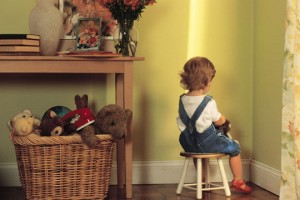In Preventive Discipline Part 1, I discussed how so many problems in the classroom can be avoided completely if good preventive measures are implemented. In Part 2, I will give some practical suggestions for dealing with issues that you may confront in the Bible class.
If a child is being inattentive, walk around the classroom and stand near the child or gently put your hand on his shoulder while you continue teaching. That lets the child know that you are aware that he wasn’t following along, without making it a big deal or embarrassing the child.
If you notice a child doing something he shouldn’t, make eye contact with him and give him “the look”. You know the one I mean. The one that says, “I saw what you did and you had better stop doing that now!”
When you notice a child misbehaving, call the child by name and give a positive and specific directive. For example, “Matthew, keep your hands to yourself” rather than “You need to stop it!”.
If the volume of voices is getting too loud, don’t keep raising your voice to talk above them. Get their attention, maybe through a clap of the hands, flicker of the light switch, or snap of your fingers. Then lower your voice to speak to the class.
If necessary, pull a child away from the group. This may be to remove the child from another child that he keeps touching or kicking. It also may be that they are not allowed to participate in an activity for a time until they can act appropriately.
If a child needs to be corrected, talk to him individually. Never scold in front of the class. We NEVER want to embarrass a child in our class! This is also a good reason to have a co-teacher or helper in your class so that you can step quietly outside the door if you need to talk to a child.
If you are having a major difficulty with a child, ask for help! There’s no shame in looking help from another teacher, an elder, or the parent.
Do not gossip to other church members about your student with behavior issues. Don’t forget the golden rule. If that were your child acting out in class, would you want everyone talking about him that way? Do you want your child to develop a reputation for being the difficult kid in Bible class so that future teachers dread to see him coming? Give the consideration to other parents and children that you would want for your own family.
When any type of correction must occur, do it with love and concern for the child. NEVER show anger or frustration with the child.
Be consistent! Don’t laugh at something today that you will punish tomorrow!
Remember, that you have the power to make your students feel loved and encouraged or humiliated and discouraged. Make Bible class a wonderful experience for your children!
